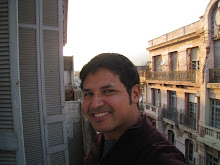انا أسمي ميغيل كنشس‘ وَ انا مدرس في كُلية التربية عدن. انا من تكسَاس من مدينة سان انتونيو.
دائماًً أقرأ العربية
دائماًً أقرأ العربية
Check it out! I am learning to type Arabic too now. It’s fun and there are a couple of fonts that are really cool looking. I can handwrite this as well, but not as beautiful as this.
So, I am really enjoying my study of Arabic these days. I have found a teacher, Dr. Ahmed Mohammed Saleh, Dean of the Language Institute at the University of Aden. Originally from the Yaffa region of Yemen, Dr. Ahmed is an accomplished scholar who did years of study in Moscow. Of course, he is an expert in fooshal (classic) Arabic, Yemeni dialect, Russian and English as well.
We meet 6 hours a week and look over several lessons. I am noticing that I can go pretty quickly through the lessons because of my previous experiences with Arabic. At San Antonio College, I took a class with Father John Al-Nahal from Lebanon. A pastor at St.George Maronite Church, he taught our class the Huruf, or Arabic alphabet which has 28 letters.
 This helps and then of course my informal studies of the Hassaniya dialect while I was working as a Peace Corps volunteer in Mauritania also help…though there is considerable difference between it and Adeni Arabic or Classical Arabic. Even basic words like Yes and No are very different:
This helps and then of course my informal studies of the Hassaniya dialect while I was working as a Peace Corps volunteer in Mauritania also help…though there is considerable difference between it and Adeni Arabic or Classical Arabic. Even basic words like Yes and No are very different:Yes & No:
Yemen: Nam & La
Mauritania: Ehay & Abday
Funny enough, I occasionally discover Arabic words that are more or less identical in Spanish:
Arabic: 1.zaytun 2. inshAllah 3. thor 4. fulana
Spanish: 1. aceituna 2. ojála 3. toro 4. fulana
English: 1. olive 2. Godwilling 3. bull 4. Ms. So & So
These words sound very similar and mean the same things in each language. It’s always a delight to discover the connections that bridge languages and cultures.
The challenge, though, in learning Arabic, is the richness of it’s lexicon or vocabulary. From different people here in Yemen I have heard 2 things about “camel”….one is that there are 17 different words in Arabic that mean camel. Another person told me that there is an old poem that lists 70 different words for camel. I’m not sure which is true, but I am impressed by the lexical luxury of such a language. (how do you like that alliteration?)
Needless to say, it is not easy to learn this language, but I count my blessings. Arabic has an alphabet that has 28 letters that are very graphophonemic in nature. That means the letters represent a sound each time they appear, which makes it easier to read for someone used to a similar kind of alphabet. Though the direction is the opposite of the English alphabet, that is it goes from right to left. I still recall when I first began learning the Huruf in Mauritania how fun it was to try and read signage. It felt like a game where I was “breaking the code”. I like doing that kind of stuff, like cryptoquips, igpay atinlay etc.
Yemen’s a good place to learn Arabic, so that’s what I try and do. Though, they have their own omnia or dialect of Arabic, everyone speaks one language. This makes learning that one language easier. In Mauritania, the various languages kept me on my toes and I used mostly the lingua franca there, French. I picked up some basic language in Hassaniya, and some in Pulaar as well. I even learned some words in Bambaara and Wolof.
Yemeni’s all speak Arabic.
As I’ve mentioned before, learning their language helps me bond with students and understand the challenges they face learning English. I think it’s an opportunity for me to grow and develop a skill that can be useful for connecting with people in the Aden community and the Arab-speaking populace in general. Plus, it’s fun!
Perhaps you’re wondering what in the wide wide world of sports the Arabic script above says. Well here’s the translation:
My name is Miguel Conchas and I’m a teacher at the College of Education in Aden. I’m from San Antonio, Texas. I always read Arabic.
No I don’t always read Arabic, but it was nice to write it.
If you'd like to learn more about Arabic, here's a link to a site that gives a free course online:
I highly recommend studying a foreign language for the rest of your life. Any language will do: Romance languages, Khmer, Russian, Japanese, Arabic, Chinese or Nahuatl. It raises your consciousness and may even be useful to you sometime in the future. Furthermore, it’s more than just words: it’s people, its culture, & it’s alive.
